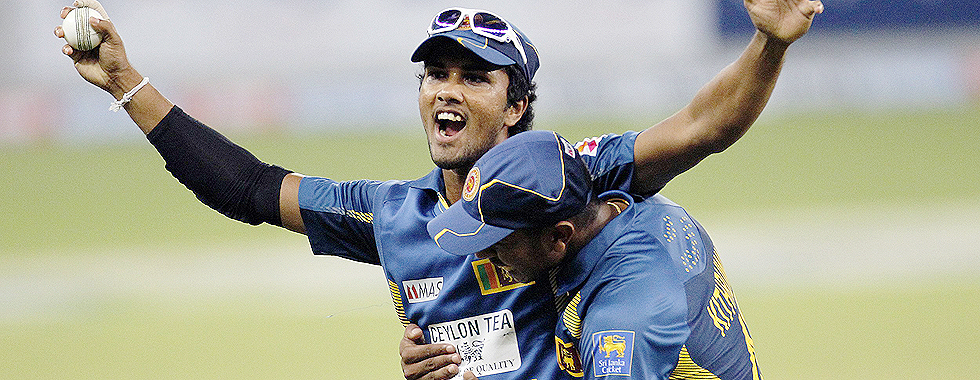The Chandimal dilemma and a walk in the woods
View(s):When you are a kid, you emulate your elders and learn things like the usage of your daily routine in life along with the do and don’ts. When it comes to recreation or sport there is no exception the kids learn and get interested in the past times that their parents do enjoy.
Then while you are growing with the skills that you learned from your elders, you like them to watch you engage in it and when they enjoy the skills that you exhibit, it gives you immense pleasure and you want to do more. Then when the others find out that your skills are better than most of the others, they want to come and watch you at play.
By this time you are a young man and ready to take the world by its tail and swing it round the universe and make the loudest rower that it even would muffle the intake of the biggest black hole. The next thing that you know that you are a star — a star so bright that the rest of the world would come a long way to see you exhibit your skills and at the same time the establishment pays you good gold to keep you performing. In short, you have become a professional in your given sport and you are practising in the international circuit and what really prompted for you to take to that sport is not even in a distant dream.
This is a crucial juncture. Some, like Lankan champion Kumar Sangakkara, thrive on the centerfold. Persons of this nature have an indefatigable thirst for stardom and they just thrive on it. Then there is the other kind. They too got talent, but for some given reasons they cannot sustain the life at the tree top. A little bit of stage fright, they crash and thus stroll into the oblivion.
This story dabbles a bit on that subject.
The other day I was talking to a former national star — a cricketer who has played the game at the highest level and was even a key member of Sri Lanka’s biggest achievement in sport – winning the ICC Cricket World Cup.
An all-time great, he was a member of the national cricket outfit from the early days of the big league. So much so as a junior member of the team he was also instrumental in guiding the Lankan team to their first major international title in 1986 – the Asia Cup – beating a star studded Pakistani team in the final.
 He was explaining in those formative days of Lankan cricket in the real international arena, everything that they did was a learning curve. Be it facing up a fast bowler or a spinner in the calibre of Abdul Qadir, was something new. He said they came into Sri Lanka cricket in a background of that nature.
He was explaining in those formative days of Lankan cricket in the real international arena, everything that they did was a learning curve. Be it facing up a fast bowler or a spinner in the calibre of Abdul Qadir, was something new. He said they came into Sri Lanka cricket in a background of that nature.
Being the minnows, they were hardly given the opportunity of playing a proper Test series.
He said: “If it was England or Australia they would give us a single Test match – there was no chance for us to get accustomed to a situation. At the same time India and Pakistan gave us three Test matches, but one hardly could call it an even playing field. As a result nothing came to us in an ideal situation. I remember there was time that I played only about five Test matches in four years between 1987 and 1990.
“This is why I am very concerned about the recent happenings at the ICC where three countries have taken over the reins of the institution. May be now the Sri Lankan cricket board may get a few extra bucks, but at the same time we will be playing a fewer cricket matches against the stronger nations. This is exactly what happened even at that time, we were given one Test match and then countries like England and Australia played against countries like the West Indies more matches. In the present scenario we also may have to play more Test matches against Bangladesh, Zimbabwe and New Zealand. At the moment we are playing good cricket and I will say that right now we are on par with any Test playing nation. But, if this is what the future holds for us, automatically our standards will also drop.”
He continued to say, “During our time, there were many cricketers who gave up international cricket at a very young age because the returns and expectations were very low, but we must be thankful that cricketers like Duleep Mendis and Roy Dias for passing on their skills to us, in the sense that we learned how to cope in the international arena and rub shoulders with the best of the day.”
The past champion cricketer then explained how they marked their team and prepared themselves to climb to the statute of winning a Test match overseas and to the winning of the 1996 World Cup.
“If 1987 was bad year where we played only one Test match for the whole year, 1997 – one year after won the World Cup, our calendar was full. But, still we were not fully fledged professionals. Besides cricket we also had to think of the afterlife and find a way of sustaining ourselves in the post-cricket era.”
The stalwart explained how the baton was passed over to the next generation cricketers in the calibre of Sanath Jayasuriya, Marvan Atapattu, Muttiah Muralitharan and Chaminda Vaas to take the achieved standards forward, in the post-World Cup hyper.
Likewise the onus of the playing field was passed on to cricketers like Mahela Jayewardene and Kumar Sangakkara who now have matured and are in the process of passing on the ‘mantra’ to the next generation.
He was very happy about how Sangakkara and co are guiding the next generation of Sri Lankan cricketers and how they are doing it by example. “It has made it very easy for Angelo Mathews to ease himself into position of leading the country. At the same time he has taken up the challenge and become the fixed No 6 batsman in the lineup. He has taken the onus and is scoring runs from that position and this has made the Lankan batting look that much stronger.”
However, his only concern was the plight of young Dinesh Chandimal whom he feels was thrown into the deep end even before he could cover the short length of the international cricket pool. The stalwart feels that the burden of the T-20 captaincy and vice captaincy of the Test and the ODIs has made an impact on this young head. He said: “As I know Chandimal works hard at his game and is a keen student. But, ironically there was a certain section in the think tank who thought that he was ready for bigger deeds, but, now the burden is on the poor player. I only hope that he would overcome this nightmare and get back to his proper game. With the added burdens of captaincies and vice captaincies, he thinks he has to perform beyond his true capabilities. With this notion he has put a lot of pressure on himself and is crumbling under his own steam”
So much so may be due to his poor form, Chandimal – the vice captain of the Lankan ODI team — was left out in preference to batsman Ashan Priyanjan in the Asia Cup game against Bangladesh on Thursday.
Prior to his added accolades he became one of the youngest internationals to score an international hundred at Lord’s. So now the onus is squarely on him. He has to balance his concentration of the given responsibilities while realising as to why he first made it into the national squad as a batsmen.
Or else, is he just a victim of circumstances?



